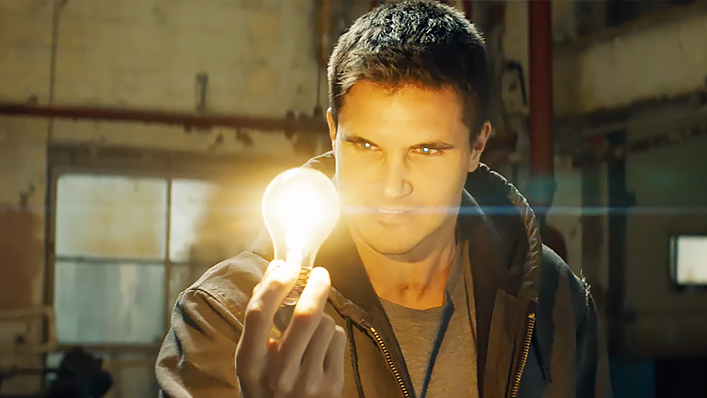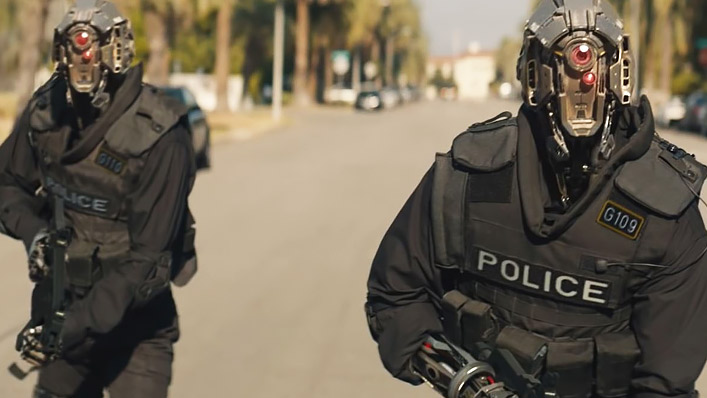Sci-fi thriller Code 8 is trending on Netflix. But is it any good?

Code 8 is the kind of movie that might ordinarily disappear without a trace. However it’s hanging around on the Netflix homepage and proving popular with Australian audiences—so critic Travis Johnson took the bait and pressed play.
The streaming landscape is chaotic but some big hitters are easy to predict. Quarantine may have given Tiger King a boost, for instance, but it is exactly the kind of trashy scandal documentary series that rises to the top of Netflix’s algorithmic soup.
See also
* All new movies & series on Netflix
* All new streaming movies & series
There are, however, always some surprises. One of them is Code 8, a modestly budgeted Canadian sci-fi thriller that has been trending on Netflix for a while now, taking prominent positions on its Australian ranking board.
At any other time, Code 8 would have more than likely sunk without a trace. But right now it’s ticking boxes that viewers seemingly very much want ticked. Which means it’s time to investigate what the hell this thing is.
What is Code 8?
Written and directed by Jeff Chan, expanding on his 2016 short film of the same name, Code 8 takes place in the very near future in the fictional Lincoln City. In this world about four percent of the population are born with superpowers, and are effectively a superhuman underclass—heavily policed, licensed and oppressed by the unpowered majority.
Connor Reed (Robbie Amell), a young man with electrical powers, falls in with criminal Garrett Kelton (Stephen Amell) and his gang and starts committing crimes to pay for his ailing mother’s health care. From there we go on a gritty thrill ride through the underworld of Lincoln City, where unlicensed superhumans peddle a weird drug called Psyke, and police use aerial drones and combat robots to try and stamp them out.
The whole thing is a big ol’ labour of love, with the approximate $3.5m budget raised via IndieGogo. The Amell cousins activated their CW/DC fanbases (Robbie is Firestorm, Stephen is Arrow) with enthusiastic social media messaging. The film pulled about $150,000 in limited theatrical release last year, which is a disappointing result. But as of its April 11 Netflix debut, it is comfortably occupying upper echelon slots in the streaming giant’s top 10 ranking system in multiple countries.
Is it any good?
Uh, it’s fine. Code 8 is a grab bag of tropes and sci-fi conventions, borrowing from countless other properties both high profile (X-Men’s Mutant Registration Act, Robocop’s automated police force, etc etc) and more niche (Lincoln City is Kurt Busiek’s Astro City, with the powers dialed down to budget-friendly levels) franchises. Which means it never quite finds its own voice—the magpie-nest of different ideas and influences just kind of sits in a pile, never becoming its own thing. There are some fun action beats and interesting and creative uses of powers, but nothing to really make you sit up and take notice. But that is part of the popularity, because Code 8 is very much…
A movie for these strange times
While we’re all reeling from the shock of our new circumstances, what we really need is the comfort of the familiar, which Code 8 delivers in spades. The movie itself might be a relatively fresh production, but what it offers is a collection of easily recognizable tropes and figures that give us a bit of anchorage in These Uncertain Times.

The Amell cousins activate our fondness of the CW superhero soaps. The plot evokes any of the Marvel X-franchises you care to name and the aesthetic is a grimy, urban crime thriller grey (indeed, you could strip out the superhuman stuff and have a serviceable action thriller with very little retooling). For all its powers, pathos and drama, there’s nothing to upset the apple cart in Code 8.
It’s the perfect film to chuck on while you’re doing something else. And right now, our attention spans shot by quarantine, we’re all doing something else, even if it’s just mindlessly scrolling through Facebook. Code 8 works because it is undemanding. It slips right in through the optic nerve, past the forebrain, landing in the back there, where it nestles with fond memories of all the other genre fodder it’s cribbing from.
And that’s fine
There is, rest assured, nothing wrong with that. Movies aren’t just discrete artifacts—they are products of their time. In that time they’re doing a kind of cultural work that either resonates or doesn’t with the audience. Maybe Code 8 would have disappeared into the back blocks of the Netflix menu at any other point in history, but right now it’s connecting with an awful lot of people. It’s not brilliant cinema by any stretch of the imagination, but it seems to be the movie we need right now.

















